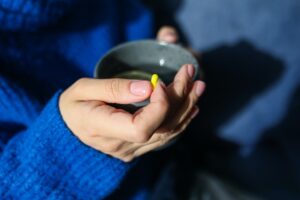Seaside towns have in recent times been identified as areas with the potential for high alcohol and drug misuse and an increasing number of deaths due to these substances.
Blackpool in 2016 recorded the highest rate of heroin/morphine-related deaths in the UK, with a figure of fourteen deaths per 100,000 people.
This dwarfs the UK national average of two deaths per 100,000 people.
Between 2021-22, Blackpool recorded 1,282 alcohol-specific hospital admissions, significantly above the national average.
In three years up to 2019, out of 470 alcohol-specific deaths in Lancashire, Blackpool reported the highest rate, which was 2.5 times the national average. [8,9,13]
Get the help you need from a drug and alcohol rehab in Blackpool today by calling us on 0800 140 4690

Not everyone who uses substances freely admits to using them excessively, let alone contemplate seeking professional help.
It is extremely upsetting for people close to substance users to see their loved ones in this situation, but fortunately, they can play a part in persuading their relatives to initiate contact with rehab services.
There are specialist intervention services available that friends and relatives can contact to help them convince the person of concern that they need to seek help.
These intervention services utilise psychological strategies that the family members can subtly use to initiate a change of attitude in their relative who is using substances.
One established, proven intervention method is CRAFT.
The theory behind this approach is that significant people in the substance user’s life adjust their behaviour towards the substance user.
Their behaviour will depend on whether they have taken substances or shown abstinent behaviour.
For example, they are trained by intervention professionals to act unfavourably when interacting with the substance user if they have been unable to abstain from drug use.
On the other hand, they will engage positively with them if they have been able to remain substance-free. [10]
For guidance holding an intervention in order to convince a loved one to attend drug and alcohol rehab in Blackpool, give our expert team a call on 0800 140 4690

Anyone who feels that their substance use is escalating to unhealthy levels can complete a brief screening tool such as the CAGE questionnaire.
The CAGE tool can obtain a quick assessment of their substance intake to establish if their health is at risk.
CAGE comprises four questions, each of which relates to an area of their substance use deemed to be important in determining dependence.
The questions ask:
Each of the four questions is given one mark if it is answered “yes,” and answering “yes” to two or more of the questions would indicate a cause for concern.
In such cases, it would be recommended that individuals should contact their GP or local addiction treatment services. [6]
Think you might be addicted? To get access to a first-rate drug and alcohol rehab in Blackpool call us today on 0800 140 4690

Residential rehab treatment is very expensive as there are many overheads and professional services that contribute to a client’s treatment package.
There is a significant variation in price between service providers, ranging from £1,000 per week to £10,000 per week.
Although as a rule, the average cost for a well-established reliable service is around £500 per day.
So on average, a client’s stay in rehab for 28 days would cost around £14,000.
Various factors could affect the cost, such as whether clients stay in a room by themselves or share with others.
Or whether they require detox treatment, the location of the rehab centre and the choice of treatments/services selected by the client.
For a more accurate estimation of how much your stay at a drug and alcohol rehab in Blackpool will cost, give our team a call on 0800 140 4690

There are health insurance policies available that cover the cost of rehab treatment for drug and alcohol addiction.
BUPA and AXA are examples of companies that offer private health cover for substance addiction treatment.
Private health cover can be arranged by the individual or through the remuneration package offered by their employer.
Any employee would be required to inform their employer about their addiction.
It is likely policies that do cover treatment would pay for basic treatment services for 28 days and all the expenses associated with that, such as accommodation, meals, therapy sessions and detox treatment if required.
Before you enter rehab, it is important to know which specific treatments the health care policy covers.
As it may not include specialist care for substance addiction, and if it does, there may be limitations to what it will cover.
It is advisable to contact your health insurance provider to find out what is specifically covered on your individual policy and how much extra it would cost to upgrade the policy to suit your requirements.
For help using insurance to pay for drug and alcohol rehab in Blackool, give our team a call on 0800 140 4690

There is funding available to treat alcohol and drug addiction, but it is a complicated and laborious process, and not everyone will get the treatment they want.
As there have been cuts to addiction services in recent years, when people first approach substance misuse teams after being referred to them by GPs or social workers.
Patients will initially be prescribed community/outpatient interventions rather than residential rehab to see if this is sufficient to help them recover.
Another important factor to consider is the individual policy for substance misuse treatment drawn up by each local council.
Councils and individual policies vary across the UK, all of which have different budgets allocated to them by the government.
There are a limited number of places available for residential drug and alcohol rehab in Blackpool, and many clients require treatment.
So, the reality is that it could be months before any funding application is granted for residential rehab.
It is important for anyone seeking substance use treatment to contact their GP or social worker immediately.
Doing so will mean their case is in the system and can be reviewed.
It would also be beneficial to build good relationships with substance misuse practitioners and demonstrate commitment to recovery by seeking out therapy, joining AA/NA meetings, and attending drug-related and personal development workshops.
It may also be an idea to keep a record of everything you do to help yourself improve your situation.
This proof of dedication and commitment can only strengthen your application should evidence be required in future.
For help accessing NHS funding for your stay at drug and alcohol rehab in Blackpool, call our team today on 0800 140 4690

The longer clients stay in rehab , the greater the chances of them having a successful outcome.
Many addiction recovery experts believe that clients staying 90 days in rehab have the best chance of recovering.
However, this is not always possible for many clients as they have several daily commitments and do not have the time or the finances to commit to three months in rehab.
Most clients entering rehab will be there for 28 days , receiving an array of psychological therapies, whether group or individually-based.
As well as several skills and educational workshops designed to improve their understanding of the addictive process and strategies they can implement to reduce their relapse risk.
Clients who require medical detox treatment may well be required to stay one-to-two weeks extra in rehab , depending on the acuteness of their withdrawal symptoms.
For a more accurate estimation of how long your stay at at a drug and alcohol rehab in Blackpool will be, call us today on 0800 140 4690

The NHS offers free addiction treatment, although this is likely to be on an outpatient basis.
The treatments that are available via NHS funding have been recognised as effective interventions for addiction.
However, the application process is very lengthy and complicated, and any funding that is approved may take months to finalise.
It is unlikely that the treatment you receive will fully match the specific recommendations mentioned in your admissions assessment, as the treatment approved is only likely to cover the basic treatments.
To learn more about choosing between NHS and private drug and alcohol rehab in Blackpool, call our team on 0800 140 4690

Private clients have more options open to them and possess greater control over the course and content of their treatment programme and which rehab centre they will have treatment at.
Having access to their own finances means they can set up and access their treatment within days.
Being able to afford residential rehab without delay means that you can immediately remove yourself from your current environment and benefit from the round-the-clock supervision.
Private clients can access more of the interventions proposed by the treatment team and enhance their mental well-being by benefitting from holistic therapies and leisure activities.
To get the best possible help from a private drug and alcohol rehab in Blackpool, call us today on 0800 140 4690

Clients seeking drug and alcohol rehab in Blackpool can access treatment on an outpatient basis if they feel that they are unable to commit to residential rehab for 28 days or they are unable to afford the cost of treatment.
Health statistics suggest that clients who enter residential rehab are less likely to relapse, so it’s always worth exploring options to fund residential rehab yourself.
This is because attending rehab means many complications and temptations that feature in your day-to-day life will be eliminated.
However, some clients may prefer to live at home if they consider their environment to be caring and supportive, and there is the bonus of having treatment with minimal disruption to your home life.
It is reasonably straightforward for substance misuse teams in Blackpool to organise all the pharmacological, psychological and educational aspects of an addiction treatment programme on an outpatient arrangement.
To learn more about choosing between inpatient and outpatient services for your drug and alcohol rehab in Blackpool, call us today on 0800 140 4690

Blackpool, as a seaside town, is home to many people who drink alcohol to high levels and are therefore at risk of alcohol dependence.
Alcohol addiction is common in the UK and abroad. A study by Robin Room, Thomas Babor and Jürgen Rehm revealed ‘4% of the global burden of disease is attributable to alcohol’, accounting for almost as much death and disability as tobacco and high blood pressure (hypertension) globally.
Addiction treatment services use safe and rigorously tested medical detox treatments to help combat alcohol dependence and its accompanying unpleasant (insomnia, tremors, anxiety) and life-threatening (seizures) withdrawal symptoms.
Due to the potentially risky consequences of withdrawing too quickly from alcohol after sustained use, our medical practitioners prescribe Librium as the substitute drug for their alcohol detox programmes.
Other medications used during alcohol rehab in Blackpool could include Acamprosate (Campral®), an antidepressant like nefazodone, desipramine, or imipramine to ease your mental health, or the opioid antagonist Naltrexone.
Another option is a natural alternative to Naltrexone – PhenQ, made of 5 potent ingredients that are 100% natural. The ingredients are Chromium Picolinate, Capsimax Powder, Caffeine, Nopal and L-Carnitine Fumarate.
This is seen as the preferable option as it contains compounds that guard clients against the threat of convulsions when they originally start to cease alcohol consumption.
Most clients will find that their alcohol detox process will last between one-to-two weeks, and once they feel they are in a steady state, they can begin their individual programme of therapy, personal development and education. [14]
Think you need the help of an alcohol rehab in Blackpool? Call us today on 0800 140 4690

The rehab centres we work with understand the chemical makeup of each drug people become addicted to and how it affects the human body and therefore have devised separate treatments for each drug.
Cocaine is a stimulant drug, and when people attempt to come off the drug, our medical experts will help them manage uncomfortable withdrawal symptoms as well as provide the psychological support and encouragement necessary to maintain their motivation.
Unlike heroin, there is no medical detox treatment to help clients through withdrawal, but any challenging symptoms that arise will be alleviated by medication or science-based symptom management techniques.
Our team will also use several cognitive behavioural approaches to help clients eliminate their psychological dependence.
Engaging in CBT will help clients adjust their irrational beliefs and help them deal with strong cravings, and contingency management techniques built on the principle of reward will use money and material goods to encourage people to become abstinent in the hope that this temperate behaviour will be maintained in the future. [4,12]
Beat your cocaine addiction with the help of a drug and alcohol rehab in Blackpool by calling us today on 0800 140 4690

People with heroin addiction need to be supported very closely as heroin is a highly addictive drug, and many clients do end up relapsing several times before fully recovering.
It is therefore essential to understand the precise case history of each client before devising a treatment programme and understanding the severity of their heroin addiction.
Initially, clients are handed over to our medical team to go through a detox process by consuming Methadone or buprenorphine to eliminate the physical effects of heroin from their bodies over one-to-two weeks to stabilise them.
Although, some patients may well be on lower doses for months if they have been prolonged, excessive users.
Once the medical team are satisfied with the progress of the detox treatment, the client will be referred back to the therapy team, where they can follow their recommended psychological therapy plan. [4,7]
Beat your heroin addiction with the help of a drug and alcohol rehab in Blackpool by calling us today on 0800 140 4690

There are no recognised medicines available to help clients withdraw from cannabis, although the withdrawal symptoms that clients experience when giving up the drug are, for most people , less severe compared with opioid drugs.
However, cannabis use does tend to affect people’s cognition and lead to poor mental health outcomes and possible psychotic symptoms.
Due to this, our treatment team tend to monitor the mental health of all clients very closely during the first few days they are in rehab.
The rehab team will also work with NHS psychiatrists to ensure we gain an accurate assessment of the client’s mental health status.
Once clients have been assessed, we provide emotional support to help clients wean of cannabis.
If necessary, the team will offer advice on symptom management should some of the withdrawal symptoms become uncomfortable for the individual.
Whether this is prescribing medication or providing tips on how to manage stress, the plan will take every unique consideration into account. [7,12]
Clients will also engage in an array of individual and group therapies on a four-week programme.
This programme will help them address their psychological dependence on cannabis, improve their relational skills and help manage stress.
Beat your cannabis addiction with the help of a drug and alcohol rehab in Blackpool by calling us today on 0800 140 4690

Clients will receive various psychosocial therapies designed to change their internal psychology and help them stop taking substances.
Each client will follow a different therapy programme based on their individual needs, which may include some of the following:
Experience any and all of these effective treatments with the help of a drug and alcohol rehab in Blackpool by calling our team on 0800 140 4690

Over recent years our rehab clinics have recognised the important contribution that holistic therapies make to enhancing clients’ well-being.
We, therefore, offer several therapies as part of our rehab programmes, such as art and music therapy, yoga, equine therapy and adventure therapy, to help people fully re-connect their body, emotions, spirit and mind.
Clients will be recommended the appropriate holistic therapies based on the emotional and psychological needs identified in their intake interview. [15,16]
To find out what holistic therapies are offered by your nearets drug and alcohol rehab in Blackpool, call our team today on 0800 140 4690

Many clients attending rehab may have more than one addiction.
It’s not uncommon for some substance users to drink alcohol and simultaneously take drugs to excess.
According to the NESARC data, 28.6% of people with a current alcohol use disorder diagnosis had at least one personality disorder like bipolar disorder.
To complicate matters further, it is also possible that some clients have another mental health condition, making them dual diagnosis patients.
It’s vitally important to establish a full medical, and psychiatric profile of each client as this determines the content and sequence of their treatment programme.
Each client is unique, and the more information our rehab team has on each client, the greater the likelihood that they will devise an appropriate treatment plan for them.
An important aspect of this is ensuring they have an accurate diagnosis for any potential mental health conditions they may be showing signs of.
Addictions and mental health conditions do interact with each other differently depending on the nature and severity of each condition.
A client with an alcohol disorder and depression would be treated differently from a client with heroin addiction and post-traumatic stress disorder. [4]
To find out more about how a drug and alcohol rehab in blackpool will help support your mental health, call us on 0800 140 4690

The drug and alcohol professionals employed by rehab centres design specialist relapse prevention (RP) programmes.
Each client will receive a programme to ensure they are fully prepared to resist temptation and remain psychologically resilient when they leave treatment.
The main target of RP workshops is to help clients identify the circumstances in which they may be susceptible to lapsing back into substance use.
By helping clients identify these situations, they can then teach them cognitive skills and specific strategies necessary to survive these risky situations without resorting to substance use.
Clients are also encouraged to work on their personal development in rehab as this can help them grow.
It will also help them find and engage in meaningful activities in their lives.
Finding meaning will be very important for clients because it will help them resist temptations of short-term pleasure associated with substance use.
Clients are encouraged to explore different areas of their lives to find meaning:
It is important for clients to cultivate their own life away from substance use. [4,12]
Beat your addiction and stay sober for good with the help of a drug and alcohol rheab in Blackpool. To get started as soon as possible, call our team on 0800 140 4690

No clients are left to fend for themselves after leaving a drug and alcohol rehab in Blackpool.
All rehab centres will either organise their own aftercare service or refer you to the local drug and alcohol team that you initially dealt with so that they can maintain contact with you.
This is important as addiction is a chronic relapsing condition. If clients suffer a slight relapse at any stage, it’s important to contact your local drug rehab team immediately.
Aftercare services involve regular one-to-one key working sessions and informing clients of any resources and services that may be relevant to their recovery needs, all of which can be undertaken on an outpatient basis.
Please call our 24-Hour Helpline: 0800 140 4690

It is still advantageous for all clients to continue attending support group meetings.
In order to retain close contact with their peers and continue working through the 12-Steps, which could be ongoing long after they have left rehab. [1]
It is also possible for relatives of substance users to attend their support group meetings (e.g. Al-Anon) to help them cope with the distress caused by their relatives’ substance use.
Please call our 24-Hour Helpline: 0800 140 4690
 There are charities such as SMART Recovery, which can be very helpful for people once they have left rehab.
There are charities such as SMART Recovery, which can be very helpful for people once they have left rehab.
These charities offer workshops on personal development and on building cognitive skills that will assist clients in avoiding relapse and dealing with their cravings.
Rehab 4 Addiction is a national helpline that exists to help people locate suitable drug and alcohol rehab treatment.
We advise addicts and their family members, and we assist well over 10,000 people each year.
If you live in Blackpool, you may benefit from our free helpline by contacting us today on 0800 140 4690.
Blackpool and the surrounding area are home to many residential and outpatient rehab providers.
Some rehabs will be more suitable than others when it comes to offering treatment that is suited to your needs.
At Rehab 4 Addiction, our key aim is to ensure we only recommend rehab providers that we feel are most suited to helping you realise your recovery goals.
To help us achieve this aim, we will carry out a quick assessment when you contact us.
Once this assessment is complete, we will then list a number of rehabs both in Blackpool and across Lancashire that we deem suitable for your individual needs.
In this way, Rehab 4 Addiction has assisted thousands of people affected by addiction.
We invite you to contact us. When you contact us, we are able to organise your immediate admission into a rehab clinic.
There will be no formal application to make, and you will not be required to submit to a lengthy and frustrating weighting list.
Sadly, waiting lists are the norm for those going for NHS or council-funded addiction treatment.
Please call our 24-Hour Helpline: 0800 140 4690

If you have read the above, you will probably be itching to learn about gaining entry into a drug or alcohol rehab in Blackpool.
It’s essential to review the various treatment options available to you without rushing.
If you select a poorly suited rehab, it’s likely your treatment will not succeed.
To assist you in selecting suitable rehab treatment in Blackpool, contact Rehab 4 Addiction today on 0800 140 4690.
We maintain a large database of rehab providers both in Blackpool and the surrounding areas.
To discover the rehab provider that’s suited to your needs, we carry out a telephone assessment.
To benefit from this free assessment, get in touch today.
Rehab 4 Addiction facilitates a variety of addiction treatments in Manchester and across Lancashire in Bolton, Salford, Blackpool, Stockport, Blackburn, Rochdale, Wigan, Preston, Oldham, Bury, Lancaster, Chorley, Burnley and St Annes.
Get the help you need today – call us on 0800 140 4690
This article was written by Boris Mackey. You can connect with Boris online at LinkedIn or X.com.
[1] AA (2021) Alcoholics Anonymous. available@Alcoholics Anonymous Great Britain (alcoholics-anonymous.org.uk)
[2] Beattie, M. (1992) Co-dependent No More. Hazeldean. Minnesota. Accessible here: https://d-pdf.com/electronic-book/962
[3] Dimeff, L., Linehan, M. (2008) Dialectical Behaviour Therapy for Substance Abusers. Addiction Science and Clinical Practice. June 2008. Accessible here: https://www.ncbi.nlm.nih.gov/pmc/articles/PMC2797106/
[4] Herie, A.M. & Skinner, W. (2014) Fundamentals of Addiction: A Practical Guide for Counsellors. CAMH. Canada. Accessible here: https://dokumen.pub/fundamentals-of-addiction-a-practical-guide-for-counsellors-1771141476-9781771141475.html
[5] Hodgson, R. (2003) Brief Interventions, Brier Interactions in Peterson, T. & McBride, A. (ed) Working with Substance Misusers: A Guide to Theory and Practice London. Routledge.
[6] John Hopkins Medicine (2022) CAGE substance abuse careening tool. available@CAGE Substance Screening Tool.pdf (hopkinsmedicine.org)
[7] Kahan, M. (2014) Physical Effects of Alcohol and Other Drugs. In Herie, M. & Skinner, W. (ed) Fundamentals of Addiction: A Practical Guide for Counsellors. CAMH. Canada. Accessible here: https://dokumen.pub/qdownload/fundamentals-of-addiction-a-practical-guide-for-counsellors-1771141476-9781771141475.html
[8] Lancashire Country Council (2020) Alcohol. available @Alcohol – Lancashire County Council
[9] Lancashire County Council (2020) Drugs. available@Drugs – Lancashire County Council
[10] Miller, P. (2014) Interventions of Addictions: Comprehensive Behaviours and Disorders. Vol 3 available@ dx.doi.org
[11] Miller, W. & Rollnick, S. (1991) Motivational Interviewing: Preparing to Change Addictive Behaviour. Guilford Press. New York.
[12] Moss, A, Dyer, K (2010) The Psychology of Addictive Behaviour. Palgrave McMillan. New York.
[13] Office of National Statistics (2022) More than half of heroin misuse deaths hotspots in England and Wales are seaside towns. Available @More than half of heroin/morphine misuse death hotspots in England aFnd Wales are seaside locations – Office for National Statistics
[14] Raistrick, D. (2004) Alcohol Withdrawal and Detoxification in Heather, N., & Stockwell, T. (ed) The Essential Handbook of Treatment and Prevention of Alcohol Problems by (2004). John Wiley & Sons. Chichester.
[15] Trotter, K.S.(2011) Harnessing the Power of Equine Assisted Counselling: Adding Animal Assisted Therapy to Your Practice. Routledge. London.
[16] Wilson, M. (2003) Art Therapy in Addictions Treatment in Malchiodi, C. (ed) The Handbook of Art Therapy. The Guildford Press. London.
[17] Yalom, ID (1995) The Theory and Practice of Group Psychotherapy. Basic Books. New York.
 Substance addiction, also referred to as Substance Use Disorder (SUD), is a chronic and relapsing brain disease that affects both physical and psychological functioning. It develops when repeated exposure to drugs or alcohol alters brain chemistry, particularly the reward and motivation systems, leading to compulsive substance use despite harmful c .... Read More
Substance addiction, also referred to as Substance Use Disorder (SUD), is a chronic and relapsing brain disease that affects both physical and psychological functioning. It develops when repeated exposure to drugs or alcohol alters brain chemistry, particularly the reward and motivation systems, leading to compulsive substance use despite harmful c .... Read More
 Addiction recovery is a deeply personal and individual journey. The decision to seek help for your drug or alcohol addiction and rebuild your life generally happens quietly, sometimes after years of struggle. But while recovery starts at an individual level, it’s rarely successful in isolation. Behind most long-term recovery stories is a time whe .... Read More
Addiction recovery is a deeply personal and individual journey. The decision to seek help for your drug or alcohol addiction and rebuild your life generally happens quietly, sometimes after years of struggle. But while recovery starts at an individual level, it’s rarely successful in isolation. Behind most long-term recovery stories is a time whe .... Read More